The Michael Sadler Foundation held their second annual Legacy Leadership Conference on April 14 at The Kellogg Hotel and Conference Center. The purpose of the conference is to empower participants with skills to overcome adversity in their everyday lives.
The speakers included Super Bowl 50 Champion Bennie Fowler III; pediatrician, professor and public health advocate Dr. Mona Hanna-Attisha; MSU head basketball coach Tom Izzo; and MSU head football coach Mel Tucker.
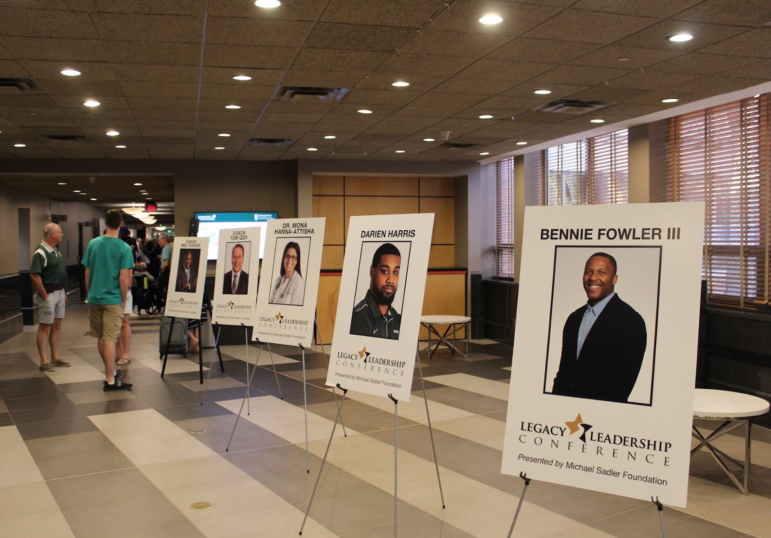
The Michael Sadler Foundation was created with the mission of inspiring and empowering students to realize their individual potential. The foundation began after the passing of Michael Sadler, MSU punter (2011-14), in order to remember his legacy and inspire others.
“When we’re talking about legacy and thinking about legacy,” Fowler, who played with Sadler at MSU, said, “Mike left an incredible legacy every single day. That’s the reason why we’re all in this room today.”
Sadler is remembered as a friend, a teammate and simply an all-around good person. His achievements include being the first Four-Time Academic All-America in MSU football history, among many others. Fowler remembers Sadler as “one of the best punters, one of the best players, of all time. Michael lived his life in such an incredible way.”

The foundation includes multiple programs and provides many awards and scholarships. One of these programs being the Legacy Leadership Conference. The conference aims to help students and members of the public look at the adversity in their lives and seek how to overcome it. It also encourages the public to live by the foundation’s motto “The prize is in the journey.” The speakers at the event all have faced adversity in distinct ways, and offered up their tools and techniques on how to keep pushing forward.
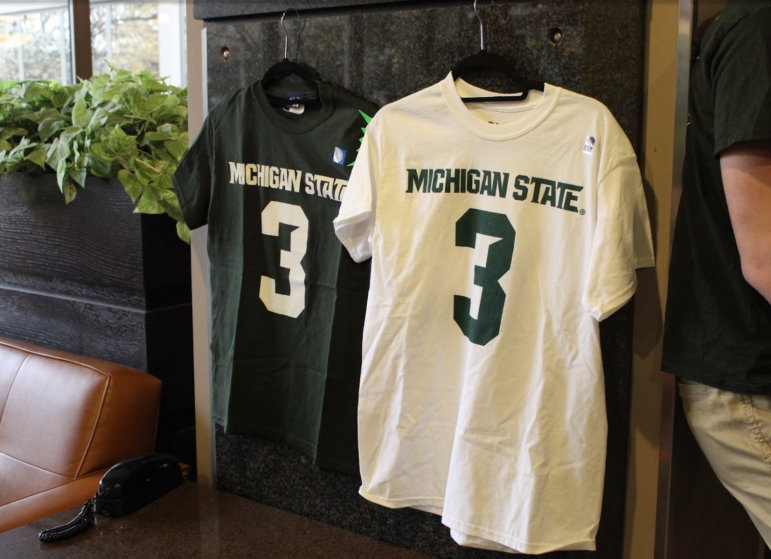
Fowler talked about the adversity he experienced as a college and professional football player. Fowler played wide receiver at MSU and was signed by the Denver Broncos as an undrafted free agent in 2014. He was a member of the 2014 100th Rose Bowl Championship Team at MSU and a member of the 2016 Denver Broncos Super Bowl 50 Championship Team, catching the final pass from quarterback Peyton Manning. But these accomplishments were not without struggle.
Darien Harris, former linebacker at MSU with Fowler, asked Fowler about the hurdles he had to jump to get where he is today.
Fowler touched on his injuries, both in college and in the pros. He touched on his first year at MSU, fracturing his foot, and spending the year on crutches, continuously asking himself “Why is this happening to me?” As a redshirt freshman, Fowler was ready to play, but broke the same bone in the other foot. Fowler said that the only way he got through those challenges was with the community that surrounded him.
“When people talk about getting over it and handling adversity, I think one of the most important things is to lean on community,” Fowler said. “And as we continue to do incredible things in life, I think one of the most important things we can do is surround ourselves with good people. You surround yourself with good people and it helps you during those tough times.”
Fowler also spoke on his struggles in the National Football League (NFL), in not being drafted and being cut multiple times throughout his career, and how important community was to him during that time.
Fowler reflected on the strong leaders he had in his life, specifically the multiple quarterbacks he played under- including Kirk Cousins, Connor Cook, Peyton Manning, Tom Brady, etc.- and the characteristics they embodied that led to success. These included being authentic, trusting, having an incredible vision, hard work, and leading by example.
“If you have a vision or you have a goal, don’t give in,” Fowler said.
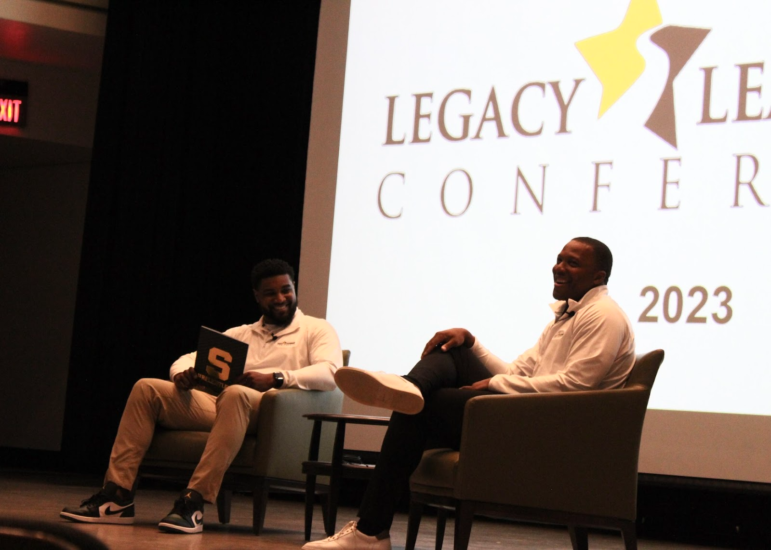
Dr. Mona Hanna-Attisha spoke next, lighting up the room with her charisma and energy as she spoke about the struggles she experienced with the Flint water crisis.
Hanna-Attisha obtained her bachelor’s degree from the University of Michigan and her M.D. from Michigan State University, and currently works as a pediatrician and professor. She is most well-known for uncovering the Flint water crisis.
Hanna-Attisha began by summarizing the events that led to her uncovering the water crisis. In 2014, the city of Flint switched their water source from the Great Lakes to the Flint River in order to save money. A year and a half later, Dr. Hanna-Attisha was a pediatrician in Flint, and began to have patients coming in asking about the water. They would say “Hey Dr. Mona, are you sure this water’s ok? It’s greenish and yellowish and brownish and it smells weird and my kid’s getting a rash?” Hanna-Attisha quoted.
But at that time, when asked those questions, she was telling her patients that everything was ok, because that is what officials and scientists were telling her. Hanna-Attisha started to get involved when she heard that this water was so corrosive that car engine parts from General Motors were being corroded by this water and that the lead pipes in the city were being corroded, thus, inserting lead into the water.
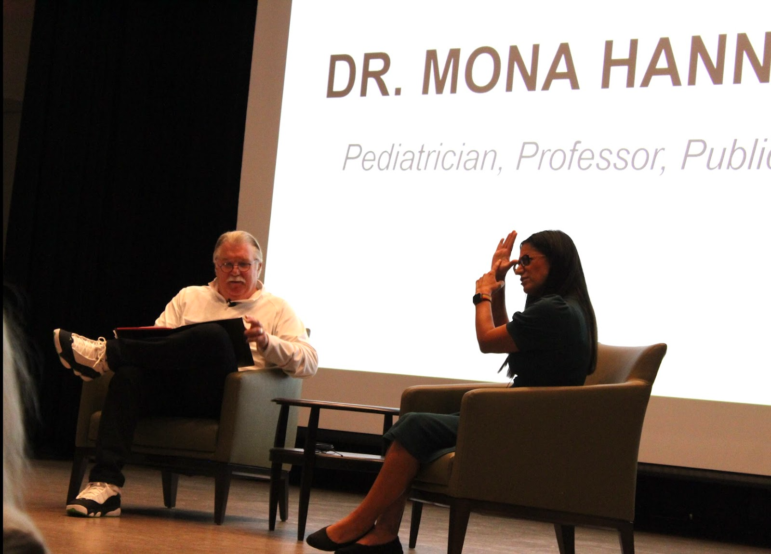
“When I heard that there was the potential of something in our water threatening the tomorrows of our children, I stopped sleeping, I stopped eating, I was consumed by trying to figure out what was going on,” said Hanna-Attisha.
Hanna-Attisha received a lot of backlash for sharing her research and discoveries about the harm that the water, specifically the lead in the water, was having on children. Everybody was being attacked in Flint for raising their concerns, and when Hanna-Attisha shared her research, the officials immediately dismissed her and began attacking her as well.
Hanna-Attisha admits that she struggled with all the hate she received. But when it got hard, she would take a step back and think “Hey, this is not about me. They can go after Mona all they want, this is about something bigger than me. This is about my kids.”
When asked about what kept her pushing forward through this adversity, Hanna-Attisha stated that the only way was to constantly be grounded in her “Why?” For Hanna-Attisha, her “Why?” is kids.
“That’s why I wake up in the morning. That’s why I went to school forever. That’s why I work late. That’s why I’m here,” Hanna-Attisha said. “My North Star, my kids.”
Hanna-Attisha encouraged the audience to find their “Why?” She spoke on how students care about so many different things today- about climate change, gun violence, democracy, voting- and how easy it is to get overwhelmed when one cares about so much. So, she encouraged students to find the one thing that keeps them up at night and put their energy towards that.
“Find your passion. Find your peeps. Find your village of people who also care about that thing.”
The conference concluded with coaches Tom Izzo and Mel Tucker both discussing the adversities they faced in their lives, defining what legacy means to them and providing advice to the public about how to overcome challenging times.
When both coaches were asked about the biggest challenge they have had in their lives and how they overcame it, both coaches spoke about their coaching careers.
“In 2011, I was interim head coach in Jacksonville and I interviewed for the head job after the season,” Tucker said. “I thought I had the job, and I didn’t get it.”
Tucker shared that the six hours following this news, he probably didn’t handle it very well. But, after that “I just had to go back to why I’m doing what I’m doing: I love coaching,” Tucker said. “It was a humbling experience, but I just had to remember why I was there.”
Izzo shared a similar experience when interviewing for assistant coach with Jud Heathcoat with a broken jaw.
Izzo also discussed his “one in a million chance” of being the head coach at Michigan State and how he overcame those odds by pushing forward and believing in the dream.
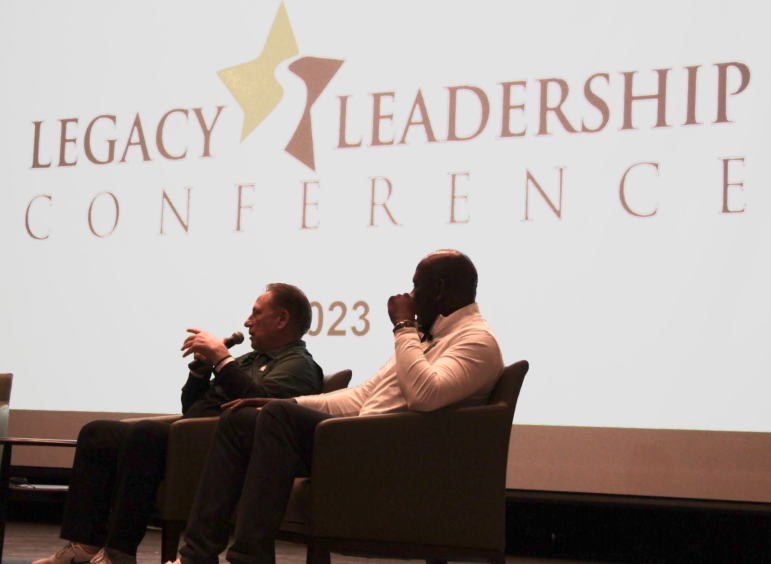
When asked what the word “legacy” meant to them, both coaches shared similar answers.
“[Legacy] means, when the good Lord calls me home and there’s people in my family talking about my life, what are they gonna say?,” Tucker said.
Tucker recalled attending Magic Johnson’s father’s memorial recently, and by hearing people talk about him and what he meant to them, that is what Tucker hopes his legacy to look like.
Izzo agreed with Tucker, but also added on the legacy of being a coach.
“I want my legacy to be ‘That’s right school and that’s wrong school’,” Izzo said, “Not old and new, but right and wrong.”
After going back and forth discussing how to build resilience, their most successful seasons and staying encouraged during long seasons, Izzo and Tucker left the audience with their last pieces of advice.
Izzo re-shared the advice he shares every time he speaks: “Make sure you meet some new people today. There are some incredible people here, make sure you get to know them, cause you never know when they’re gonna be able to help you.”
Izzo also encouraged the audience to talk about the difficult things, as so many people today stay quiet, and also to “shoot for the moon, but stay humble.”
Tucker’s last words of advice were based on his own experiences. He encouraged audience members that, during those difficult times, give yourself 15 minutes to be upset about it, then look at the facts and move forward.
“Based upon the facts that are in front of you, based on what you know is true, make a decision about what’s the next right step to take and take that step,” Tucker said.
Audience members left the conference with new tools in their toolboxes on how to handle adversity, how to overcome those difficult moments in life and how to keep moving forward.